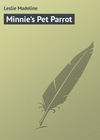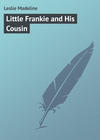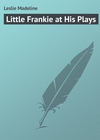Czytaj książkę: «Minnie's Pet Parrot», strona 3
Early one morning, when Poll was hanging up at a back window, she saw Tom polishing the boots, and whistling a merry tune, never once thinking of his enemy near him. Squeezing herself, as she often did, through the wires of her cage, she crept silently along through an inner room into the shed, when she flew directly at him, caught him by the legs, and held him fast.
Poor Tom was frightened nearly out of his senses, and yelled for some one to take the parrot away. The servants enjoyed the fun too well, however, to release him. They laughed heartily, telling him to shake her off; but he was paralyzed with fright, and stood the picture of horror until the cook coaxed Poll away.
At another time, she took a great dislike to the groom, who was an Irishman. Watching a favorable opportunity, she flew at him, caught hold of his shirt bosom, and held it so tightly with her strong beak, that it was some time before Mrs. Lee, who was attracted to the kitchen by the noise, could make her let go her hold of the astonished object of her hatred.
After this, whenever the women servants were displeased with the man, they would slyly let Poll out of her cage, when she darted directly toward him, and was thus the means of his losing many a dinner.
When his grievances became too heavy, he complained to his mistress, who soon put a stop to such unjust proceedings.
One evening, when Mr. Lee drove into the yard, he heard Minnie laughing heartily. Approaching nearer, he saw her sitting on the piazza; Leo, looking rather ashamed, crouching at her feet; and Poll talking, in great excitement, in exact imitation of his own tones —
“Leo, come here! good fellow! Down, sir! Leo, Leo! Hurrah, boys; what fun!”
As it was near the time for his master’s return, the dog had been more readily deceived by the parrot’s call, and had run rapidly toward the house, when he perceived that he had been made a fool of, as he often had been before.
A few hours later, they were talking it over in the library, when Mr. Lee said he thought he had read an incident very similar.
Minnie joyfully clapped her hands, while her father took down the book, and read, —
“A parrot belonging to a gentleman in Boston was once sunning himself in his cage, at the door of a shop. Seeing a dog in the distance, he began to whistle, when the animal, imagining it to be the call of his master, ran swiftly toward the house.
“At this moment, the bird exclaimed, ‘Get out, you brute!’ when the astonished dog hastily retreated, leaving the parrot laughing and enjoying the joke.”
“That reminds me,” added Mrs. Lee, “of a story a lady once told me of a parrot she owned, and which was really a wonderfully intelligent bird. A new family moved into the neighborhood, consisting, among others, of two young ladies, who always dressed very gayly.
“Polly had a bad habit of making remarks upon the passers by, as she hung in her cage overlooking the main street. If, as was sometimes the case, persons engaged in conversation stopped near the house, they would often be startled by the cry, —
“‘Go home, now! Want to quarrel?’
“But when she saw ladies dressed fashionably, she gave utterance to a most contemptuous laugh, which would have been insult enough by itself; but she often accompanied it by the words, —
“‘La, how smart I do feel!’
“My friend called at once on her new neighbors, but unfortunately found they were out; she waited a long time for the call to be returned, and at last began to wonder that no notice was taken of her politeness, when the cause of the neglect was explained by a mutual friend.
“It appeared that on several occasions the young ladies had passed the house, and had heard the insulting laugh and words, which they attributed to my friend; so that when asked whether they had become acquainted with Mrs. G., they answered, coolly, ‘We have no wish to make her acquaintance.’
“Being pressed for a reason, they at last confessed that they had been repeatedly insulted, and narrated in what manner it had happened.
“This answer caused such a burst of merriment that they were surprised, until, being told that it was the chattering of a tame parrot, they soon joined in the laugh, and went at once to make her acquaintance, and also that of her mistress.”
CHAPTER IV.
POLL AT THE PARTY
“Please, mamma, tell me all you can remember about Mrs. G.’s parrot,” cried Minnie, a few days later. “Was she as wonderful as our Poll? and was she as handsome?”
Mrs. Lee smiled. “If I should answer all your questions,” she said presently, “I should have work for the rest of the day. My friend’s parrot was green, with a brilliant red neck and tail. She was a great talker, and seemed to understand the meaning of much of what was said in her presence. I can recollect now two or three incidents which are well worth repeating.
“Polly was very fond of children, and enjoyed being let out of her cage to play with them as much as our Poll does. One day, when Mrs. G. had company, they were all startled by hearing loud and repeated screams of distress. Recognizing the voice of her favorite bird, my friend ran hastily into the yard, expecting to see Polly in some dreadful trouble. To her surprise, there was the bird perched safely on the clothes line; but going a few steps farther, she saw her youngest child, a darling girl between two and three years old, just balancing over the edge of a hogshead of water, and entirely unable to recover herself, or to utter one sound. Situated as she was, the poor child could not have remained long in that position, and, but for the alarm given by the watchful bird, must have fallen into the water and drowned.”
“O, wasn’t that a good bird, mamma? I’m sure they all must have loved her better than ever. Will you please tell the rest?”
“Mr. G. was for a long time ill, and was unable to rest well at night. Polly, who always remained in their chamber at night, was in the habit of rising early, and practising all her accomplishments by herself as soon as she could see. She would begin, ‘Mr. G.,’ and then go on, ‘My dear,’ the name he always called his wife, ‘Francis, Maria,’ until she had repeated the name of every member of the family; after which she chattered away a strange mixture of sense and nonsense until called to breakfast. After the gentleman was so ill, his best hours for rest were soon after dawn, and my friend would whisper, ‘Still, Polly! keep still!’
“This caution the parrot tried to enforce on herself by softly repeating the words away down her throat – ‘Keep still; Polly! keep still!’ and ever after until Mr. G.’s death, whenever she saw her mistress point to the bed, and put her finger on her lip, she began to whisper, ‘Keep still, Polly! Keep still!’
“At Mr. G.’s funeral, the clergyman, who was an Episcopalian, read with great solemnity the funeral service.
“The strangeness of the scene, the great concourse of people, and the sound of weeping, so interested Polly that she did not utter a word; but no sooner had the family returned from the grave than she began to utter sounds in sentences so nearly like what she had heard at the funeral, that it was recognized at once as the service for the dead.
“I forgot to tell you that, having been in the habit of hearing the children when they repeated the Lord’s prayer, she had long ago learned it, and never went to sleep on her perch without uttering the words with apparent solemnity.
“After the funeral, whenever a number of persons were assembled and began to talk in a mournful tone, Polly always seemed to think this a proper occasion to repeat her funeral service, often occupying an hour in the recital. There were no distinct words; but the sentences were so similar in length, and the tone so exactly that of the clergyman, that many persons recognized it without being told who the parrot wished to imitate.”
“I think Polly is the very best parrot I ever knew,” exclaimed Minnie. “I wish Mrs. G. would bring her here. I wonder what Poll would say to her.”
“Mrs. G.’s bird is dead, my dear; and a sad death it was too. I will tell you about it. After her husband’s decease, my friend had a little Blenheim spaniel presented her – a beautiful creature, with long white hair like satin, and salmon ears. She was naturally fond of pets, and soon became greatly attached to the dog, who returned her affection with all his heart. As soon as she entered the room, he ran joyfully to meet her, licking her hands, and showing his pleasure in every possible way.
“For some days she noticed that the bird seemed dull, and talked very little; yet she did not connect it with the fact of her attention to the dog. But at last as Polly refused to eat, and seemed uneasy when the spaniel was present, she was convinced that the bird was jealous. Every means was tried to reconcile the old friend to the new one, but in vain. Polly knew that children must of course be loved and cared for. She herself loved the children of her mistress; but she could not endure that any other favorite should divide the affection she had so long enjoyed. From this time she drooped; and upon consulting a physician, he said she had every symptom of consumption. Her feet swelled, and at last she died on my friend’s breast, seeming ‘happy in being allowed to die in the arms of one she so dearly loved.’”
A few weeks later, Mrs. Lee invited a small party of friends to take tea at her house. They were all seated in the parlor, and Poll, who was out of her cage, perched on the back of a chair in the next room, and listened with the greatest curiosity to the hum of so many voices.



















